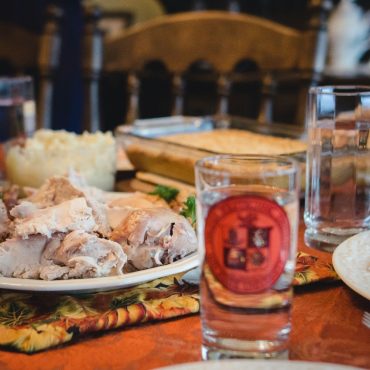
In Luke 15, Jesus reminds us to celebrate restoration and reconciliation. A lost sheep, lost coin, or lost son is found – celebrate!
Scripture:
Genesis, chapters 37-38; Psalm 7; Luke, chapter 15
Luke 15:1-7 (CEB):
All the tax collectors and sinners were gathering around Jesus to listen to him. The Pharisees and legal experts were grumbling, saying, “This man welcomes sinners and eats with them.”
Jesus told them this parable: “Suppose someone among you had one hundred sheep and lost one of them. Wouldn’t he leave the other ninety-nine in the pasture and search for the lost one until he finds it? And when he finds it, he is thrilled and places it on his shoulders. When he arrives home, he calls together his friends and neighbors, saying to them, ‘Celebrate with me because I’ve found my lost sheep.’ In the same way, I tell you, there will be more joy in heaven over one sinner who changes both heart and life than over ninety-nine righteous people who have no need to change their hearts and lives.”
Observations:
Celebrate – The Lost Sheep Is Found
The heading for chapter 15 in the CEB text reads “Occasions for celebration.” Jesus tells three parables in this chapter, all centered on that theme. The last parable, the story of the Prodigal Son, is the most familiar; however, we need to consider all three parables to get Jesus’ full teaching on this subject. And we cannot forget that all of these parables make up Jesus’ response to the statement: “This man welcomes sinners and eats with them.”
The first parable, which I’ve quoted above, is a story about a lost sheep. A man had one hundred sheep, but one went missing. What did he do? What would anyone do? “Wouldn’t he leave the other ninety-nine in the pasture and search for the lost one until he finds it?” That’s a rhetorical question; Jesus clearly believes that anyone in that situation would react the same way.
Jesus goes on to say that after the man finds his lost sheep, he would celebrate. Call the neighbors! Invite the family! Let’s have a party, because I’ve found my lost sheep! And Jesus explains his meaning by saying, “In the same way, I tell you, there will be more joy in heaven over one sinner who changes both heart and life than over ninety-nine righteous people who have no need to change their hearts and lives.”
Celebrate – A Recovered Coin, A Returned Son
The other parables in chapter 15 confirm what Jesus has just said. A woman finds one of her ten silver coins that she had lost? Celebrate! A lost son finds his way back home? Celebrate! As the father says to the older brother at the end of the parable of the Prodigal Son, “We had to celebrate and be glad, because this brother of yours was dead and is alive. He was lost and is found” (Luke 15:32, CEB, emphasis added). We had to celebrate, because something of incredible value has been recovered!
Application: Celebrate!
Celebrate – The Lost Are Found
These three parables are familiar to followers of Jesus. In fact, even people who don’t read Scripture know the basic concept of the parable of the Prodigal Son. As I read this passage today, though, several things stand out that often escape our notice. First, we have to remember that Jesus told these parables in response to the Pharisees’ criticism of him for welcoming sinners and eating with them. The Pharisees worked hard to follow the commands of Scripture and the “traditions of the elders” as closely as possible. They were convinced that this made them “righteous.”
The problem is that they often demonstrated their righteousness by criticizing and condemning others. If Jesus welcomed sinners and ate with them, they believed, then he must not be righteous either. Rather than defend his own righteousness, Jesus uses these stories to remind them – and us – that he came “to seek and save the lost” (see Luke 19:10). When “sinners” came to him, that was cause for celebration!
Join the Celebration!
Next, notice how Jesus explains the cause for celebration: “There will be more joy in heaven over one sinner who changes both heart and life than over ninety-nine righteous people who have no need to change their hearts and lives.” First, the celebration is when someone changes both heart and life.Jesus evidently saw that these “sinners” who were coming to him were coming in faith. They weren’t just coming to “see the show.”
Second, when the man leaves the ninety-nine sheep, he does not abandon them. He leaves them in the pasture, not out in the wilderness. When God seeks out the “lost sheep” or the “prodigal,” he doesn’t abandon those who are “in the pasture.” He cares for us as much as he cares for the lost. But our need is not as critical at that point, so he can leave us “in the pasture.” He knows that we will be safe.
Finally, Jesus does not say that heaven does not rejoice over ninety-nine righteous people who have no need to change their hearts and lives. In other words, “the 99” are all people who once were the “lost sheep.” Heaven rejoiced over their transformation just as it does over the “latest” lost sheep. Jesus isn’t criticizing “the 99.” He says that they have no need to change their hearts and lives. And because of that, they should be ready and willing to join in the celebration!
Prayer:
Father, thank you for reminding me today that at one point, I was the lost sheep who was celebrated. I was the prodigal who came home. Guard me from the resentment of the older brother, who didn’t want to celebrate the return of his brother. Remind me each day that Jesus came to seek and save the lost. Show me how I can join Him in that work. Above all, give me a heart that will celebrate when a lost sheep is found! Amen.

















Post comments (0)